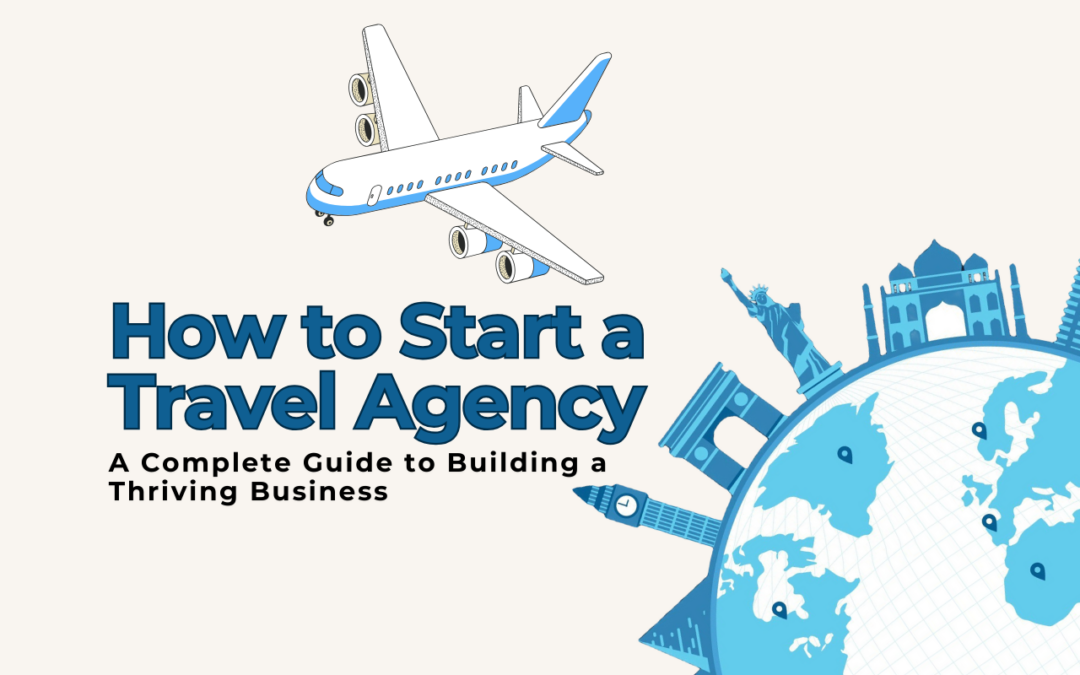Starting your own travel agency can be an exciting and lucrative endeavor. Whether you dream of helping others create unforgettable travel experiences or want to tap into the growing tourism industry, learning how to start a travel agency is the first step toward achieving your goals. In this guide, we’ll cover everything you need to know, from creating a business plan and strategies to the skills and investments required, licensing, and calculating your return on investment (ROI).
1. Business Plan: Laying the Foundation
Creating a detailed business plan is critical when you’re exploring how to start a travel agency. This document serves as your roadmap and includes the following elements:
a. Market Research:
Understand your target audience, competitors, and industry trends. Identify niches such as luxury travel, adventure tourism, corporate travel, or honeymoon packages.
b. Mission and Vision Statement:
Define your purpose and what you hope to achieve in the long term.
c. Services Offered:
List the services your travel agency will provide, such as itinerary planning, ticket bookings, accommodation arrangements, travel insurance, and guided tours.
d. Revenue Model:
Outline how you’ll earn money, such as commission from airlines, hotels, or packaged tours, service fees, or selling exclusive packages.
e. Financial Projections:
Include a budget for initial investment, operating expenses, and expected revenue streams.
2. Business Strategy: Building a Competitive Edge
To ensure success in the competitive travel industry, your business strategy should include the following:
a. Branding and Marketing:
Develop a compelling brand identity, including a name, logo, and tagline. Invest in digital marketing strategies such as SEO, social media, and pay-per-click advertising to attract customers.
b. Online Presence:
Launch a professional website with features such as a booking portal, customer testimonials, and live chat support. An active presence on platforms like Instagram and Facebook can also attract a younger audience.
c. Customer Experience:
Focus on personalized services, timely responses, and seamless travel arrangements to earn customer loyalty.
d. Partnerships:
Collaborate with airlines, hotels, tour operators, and car rental companies for competitive pricing and exclusive offers.
3. Starting from Scratch: Step-by-Step Process
- Learn the Basics:
Research how to start a travel agency, including legal requirements, industry trends, and best practices. - Register Your Business:
Choose a legal structure (sole proprietorship, LLC, etc.) and register your travel agency with the appropriate government authorities. - Create a Business Plan:
Follow the structure provided above to formalize your goals and strategies. - Develop Your Brand:
Design your logo, create marketing materials, and build a professional website. - Build Relationships:
Network with travel suppliers, airlines, and hotels to establish partnerships. - Promote Your Business:
Leverage social media, email marketing, and referral programs to attract customers.
4. Required Skills and Experience
While no formal education is required, having experience in the travel industry is advantageous. Essential skills include:
- Communication and Sales: To engage and convert potential clients.
- Organization: For managing bookings, itineraries, and schedules.
- Problem-Solving: To handle unforeseen travel issues or emergencies.
- Technology Proficiency: Familiarity with travel management software and online booking tools.
5. Investment Budget and Expenses Calculation
Here’s an estimated breakdown of costs for starting a travel agency:
6. Connections and Certifications
To successfully run a travel agency, you need to build connections and obtain certifications such as:
a. Industry Affiliations:
- Partner with organizations like the International Air Transport Association (IATA) or the American Society of Travel Advisors (ASTA).
- Establish ties with airlines, hotel chains, and tour operators for better deals.
b. Certifications and Licenses:
- Obtain a seller of travel license if required in your state or country.
- Consider certifications like Certified Travel Associate (CTA) or Certified Travel Counselor (CTC) to enhance credibility.
7. Timeline to Launch and ROI
The timeline for starting a travel agency depends on various factors. Here’s an estimated timeline:
- Preparation Phase (1-3 Months):
Complete research, create a business plan, and register your business. - Setup Phase (3-6 Months):
Build your website, establish partnerships, and develop marketing strategies. - Launch Phase (6-12 Months):
Begin operations and focus on customer acquisition.
The ROI timeline varies based on your investment and business model. Most travel agencies see a return on investment within 1-2 years, provided they focus on marketing and customer satisfaction.
Final Thoughts
Learning how to start a travel agency is a rewarding journey that combines entrepreneurial spirit with a passion for travel. By following the steps outlined in this guide, you can build a thriving travel business that caters to the unique needs of your clients. With the right skills, connections, and dedication, you can turn your travel dreams into a profitable reality.












